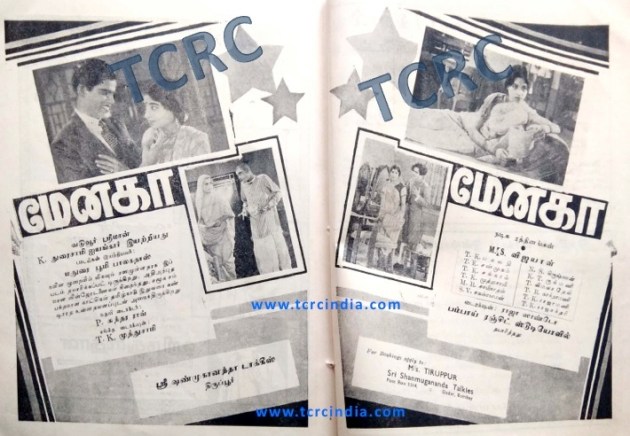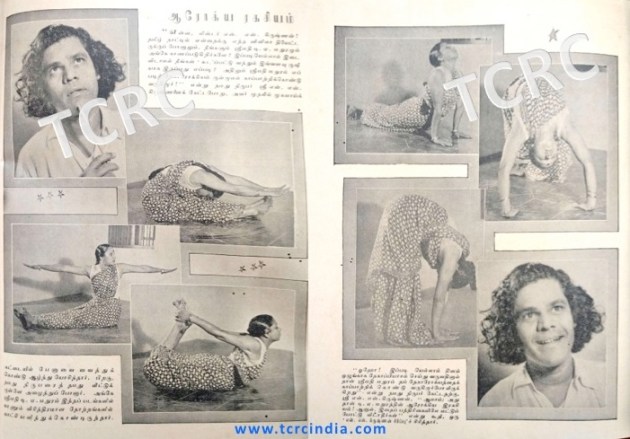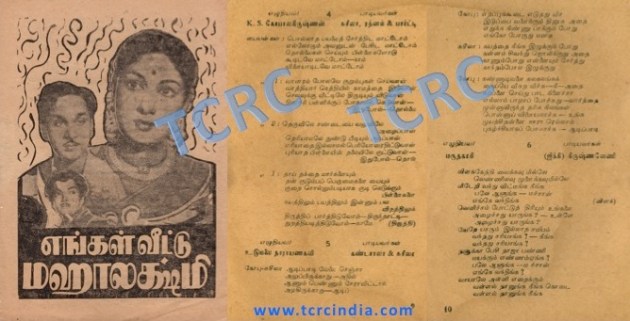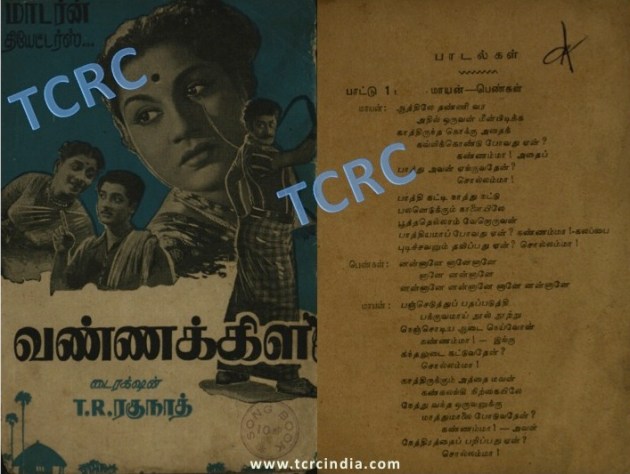By P.V. Gopalakrishnan
It is generally said, however, a pathos scene is difficult to naturally enact, it is even more difficult to be successful as a comedian as timing & body language have to contribute to its success. Pure, vulgar-free comedy that stands out is a real tough job and all were not cut to deliver that.
In the very early talkie films, there was nothing like a separate comedian. It was only later, as part of the evolutionary process of cinema, comedians came into being in Indian films to provide a relief from the main story line, which, often, was heavy with emotions.
The early cinema (we are talking about pre-Nagesh period) had a bunch of good comedians such as T.S.Dorairaj, Kali N Rathinam, T.R.Ramachandran,
Sarangapani, ‘Friend’ Ramasami, A.Karunanidhi, Kakka Radhakrishnan, ‘Kuladeivam’ Rajagopal, A.Rama Rao, Chandrababu, Thangavelu, Muthulakshmi, T.A.Mathuram, & M.Saroja.
But the Monarch of the Tamil film comedians, undoubtedly, was N.S.Krishnan (NSK).
Tamil cine goers laughed their guts out at NSK’s thought provoking jokes. NSK has often been compared to the legendary comedian, Charlie Chaplin. But, while Chaplin scored with his slapstick comedy and body language, NSK relied more on his verbal humour, one-liners and subtle messages to the audience. His comedy, which also had its share of puns, was always wholesome at its best with no double entendre or misogyny involved.
As we cannot justifiably cover all the stalwart comedians who tickled our funny bones in a single Article, we hereby restrict our current write up to the Monarch of them all – N.S.Krishnan.
N.S.Krishnan was born as Nagerkovil Sudalamuthu Krishnan in 1908 in a poor family. His childhood years were spent selling snacks in a theatre in his hometown & working as a ball picker in a Tennis Club. His lack of formal education was amply made up by his native genius & curiosity.
Later, in his formative years he joined the celebrated drama company run by TKS Brothers. He was also proficient in a rural art form known as ‘Villu Paattu’.
Later he formed his own touring theatre group and traversed the length and breadth of erstwhile Madras Presidency with his plays, which always drew packed houses.
NSK’s entry into the celluloid world was through S.S.Vasan produced and Ellis Dungan directed film ‘Sathi Leelavathy’, where he was introduced as a comedian. Though this was his debut film, his second movie ‘Menaka’ got released before ‘Sathi Leelavathy’ could hit the screen. However ‘Menaka’ was adjudged the best movie of the year in 1935.

An Advertisement of the Film MENAKA in the magazine ANANDHA VIKATAN DEEPAVALI MALAR 1935 PC: From the archives of TCRC
It was during the shooting of ‘Vasantha Sena’ (1936), directed by Raja Sandow, NSK ‘met’ co-star T. A. Mathuram and both fell in love. Their marriage was held in a simple manner, while the shooting schedule moved to Pune, with Raja Sandow presiding over the ‘wedding’. The couple got the honor of being the first real-life couple acting as couple of reel life too, between 1936 and 1957, when they did a whopping 122 films, as a pair!

An Advertisement of the Film VASANTHA SENA in the magazine ANANDHA VIKATAN DEEPAVALI MALAR 1936 PC: From the archives of TCRC
N S Krishnan, who popularly goes by his popular title, ‘Kalaivanar’, rose from humble beginnings as a ‘villu paatu’ artiste who became a master in the art of repartee. In tandem with his wife TA Mathuram, he regaled audiences, often stealing the spotlight from the lead stars. NSK was known to pen his comedy tracks himself and always ensured that he was never repetitive. Noted lyricist Udumalai Narayana Kavi usually wrote the lyrics for Krishnan.

In the early timeframe of his career, he worked with comedians like TS Durairaj, Pulimootai Ramaswamy, CS Pandian and Kali M Rathinam and later worked in most of the films of MK Thiagaraja Bhagavathar as Hero. Krishnan was also a gifted singer and his numbers in ‘Sivakavi’, ‘Raja Rani’ and ‘Manamagal’ became immensely popular.
He also produced the hit film ‘Nallathambi’, directed by C.N Annadurai. He directed films such as ‘Panam’ and ‘Manamagal’ penned by Karunanidhi. SS Vasan’s magnum opus ‘Chandralekha’ too featured Krishnan in comedy tracks. There was a time in Tamil cinema when no film was complete without NSK!
He also shared screen space in many films of the leading heroes, MGR and Sivaji Ganesan, and despite the presence of these Titans always stood out with his comedy.
NSK went on to work as unparalleled comedian in as many as 150 films, MGR starred ‘Raja Desingu’ being the last one, released after his death.
On 8 November 1944, Lakshmikanthan the gossip columnist & Editor of ‘Indu Nesan’ was knifed by some unknown persons in Purasawalkam and was admitted to the General Hospital, Madras as an outpatient. But the next day, Lakshmikanthan was murdered mysteriously while still in the hospital. The police arrested eight persons as accused for the murder including M.K.Tyagaraja Bhagavathar and NSK. This came as a rude shock to their fans and the cine world.
After thirty long months of jail term they were acquitted for want of proof by the London Privy Council, thanks to the eminent lawyer V. L. Ethiraj who argued for them at Privy Council at London. (The same illustrious lawyer founded Ethiraj College for women).
Though N.S.Krishnan did manage to pick up the threads of his life again as an actor post his release from prison, things were not quite the same & he was financially drained and his fortunes plummeted rapidly.
When Krishnan was first sentenced to jail, Mathuram took a break from her acting career. Later she came out her self-imposed exile to generate revenues for financing her husband’s appeal to the Privy Council.
When NSK was in prison, T. A. Mathuram started a drama troupe called N. S. K Nataka Sabha, which staged plays written by and starring S.V.Sahasranamam. ‘Paithiyakaran’ (1947) was one of those plays. Later Mathuram converted the troupe into a film production company and made a film based on the play. While the film, being directed by Krishnan-Panju Duo, was in production, Krishnan was acquitted released from prison. A new role was written for him in the film. NSK made fun of his stint in prison through the song jailukku poi vantha in which he described in prison life, his fellow inmates and the types of prisoners he met. MGR played a supporting role in the film.
In 1947, after his release from the prison, Nataraja Educational Society, Triplicane awarded him the title of ‘Kalaivanar’ to NSK through the ‘Father of Stage’, Pammal.K.Sambanda Mudaliyar. He is, to-date, known by this Title even without his name!
‘Manamagal’ (1951), produced & directed by NSK, saw the debut of Padmini as a lead actress. In this movie, A.Bhimsingh, who later became a big Director, was an Assistant Director to NSK. He also generously gifted his own expensive car to Baliah for his stellar performance in Manamagal.
MSV-TKR duo was formed as Music Directors by NSK for his Film ‘Panam’ (1952).
In his times, NSK was instrumental in bringing a number of leading Tamil stage and film personalities to the fore; he was also a Gandhian, patriot and philanthropist who became an active member of the Dravidian Movement. On the assassination of Gandhi, NSK raised a Memorial for the Father of the Nation at his own expense in the Municipal Park his hometown.
NSK was one of the founding fathers of South Indian Actors Association. He is reported to have even gifted his own land for its premises.
NSK passed away at his 49 on 30th August 1957, after bringing a lot of joy and cheer to his audience through his film roles.
Some of his well known films included Sathi Leelavathi, Ambikapathi, Madurai Veeran, Kala Megham, Uthama Puthiran, Sakunthalai, Arya Mala, Mangamma Sabatham, Harischandira, Haridas, Pavalakodi, Paithiyakkaran, Chandrakantha, Chandralekha, NallaThambi, Managaiyarkkarasi, Rathnakumar, Vana Sundari, Panam, Amara Kavi, Kaveri, Dr. Savithri, Mudhal Thethi, Rangin Radha, Raja Rani, Manamagal & Raja Desingu.

An Advertisement of the Film CHANDRAKANTHA in the magazine ANANDHA VIKATAN DEEPAVALI MALAR 1936 PC: From the archives of TCRC
In his personal life, he had three wives, Nagammai, T.A.Mathuram & T.A.Vembammal (T.A.Mathuram’s sister).

Stills from a short Interview of NSK in the magazine KALKI DEEPAVALI MALAR 1942 PC: From the archives of TCRC
The Tamil Nadu Government dedicated the Children’s Theatre on Wallaja Road, Madras as a memorial building in 1979, named it ‘Kalaivanar Kalai Arangam’ in his honour . His revered public statue adorns a major junction in T.Nagar in Chennai.
If NSK were to be alive today he would have been 108 years old!


